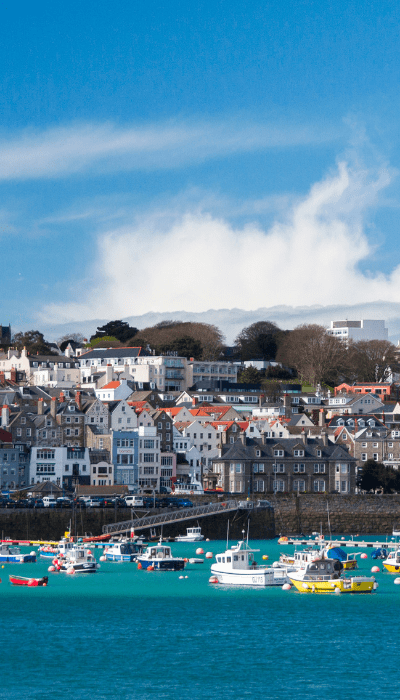Have you ever considered moving your career to the beautiful island of Guernsey? We wanted to share some insights and a guide to living and working in Guernsey, with all the important relocation factors you will need to consider before making the move.
1. Key facts about Guernsey
Many people know Guernsey for the famous Guernsey Cow dairy products which are exported to many countries all over the world, but for those who have never lived in or visited Guernsey, it is a small island in the English Channel off the coast of Normandy.
With a population of approximately 63,700 people living on the island, it is the second-largest Channel Island.
Guernsey is an independent country and despite common misconception, the island is not a part of the United Kingdom. In fact, Guernsey has been self-governed since the thirteenth century and therefore has its own laws and regulations on matters such as taxation, employment, healthcare and even the housing market.
2. Cost of living
A valuable point to consider is that residents and those working on the island will receive a 20% VAT reduction on all purchased goods, which can make a considerable difference to the cost of living.
The cost of living in Guernsey is typically more expensive than in other European countries and can even compare to prices in London, UK. This also applies to most general outgoings such as property prices, utility bills and leisure activities. However, there is a lot to see and do on the island that does not cost anything and you are only a stone’s throw away from the beach, which is always an added bonus when it is free to use.
As the island is so small there isn’t far to travel and this eliminates the hefty travel costs that most people would usually spend on petrol, train tickets or other modes of public transport.
3. Housing
There are two routes to obtaining a property in Guernsey, which are either through the ‘Local Market’ or the ‘Open Market’.
The ‘Local Market’ is a property market that is available for local residents only. To be eligible to purchase a property on the local market, you either need to have been born on the island or must have lived on the island for a certain period of time. Residents with an employment permit will also be allowed to buy what is considered a local property.
Properties listed on the ‘Open Market’ are available to all non-local or non-permanent residents. This provides a great way for non-residents on the island who have relocated to purchase a property.
Bear in mind that because Guernsey is a small island, properties for sale are limited and properties listed on the ‘Local Market’ are more readily available. These properties are also considerably less expensive than those for sale or rent in the ‘Open Market’. Therefore, we would recommend that anyone moving to Guernsey should engage a reputable estate agent and financial advisor.
More information can be found here about buying and renting a property in Guernsey.
4. Climate
Guernsey typically has a good climate all year round of warm sunny summers and mild winters. Spring also comes early to the island making it a favourable place for gardeners. At this time of year, the island is covered with thousands of colourful flowers and shrubbery.
July and August are the warmest and driest months on the island with temperatures averaging at approximately 25 degrees. Even in the winter months, temperatures do not average below 5 degrees making the climate much warmer than in the UK. With good weather all year round, it is not surprising that local residents are so sociable.
5. Education and Healthcare
Education and healthcare are both important factors for anyone considering a relocation but Guernsey is well known for having a very good education and a healthcare system.
The island has a good selection of both state and private schools spread out across the different parishes. Schools follow the same education curriculum as the UK and therefore the education provided is of a very high standard. More detailed information about applying for schools in Guernsey can be found here.
Unlike the UK, Guernsey does not have the National Health System (NHS) and all primary healthcare is carried out on a private basis. This includes A&E visits, GP appointments/prescriptions, dental health etc. However, the healthcare system is partly funded by Guernsey’s Employment and Social Security Committee which contributes to a proportion of costs based on a person’s income.
It is important to consider that unlike in the UK all emergency healthcare costs will apply each time they are used. Therefore it is recommended that all residents obtain health insurance to cover any of these unpredictable costs.
6. Life in Guernsey
With a fascinating history, Guernsey is a small quaint island and is a highly attractive place for both ex-pats and tourists, who are looking to explore a country that offers something different.
With only 15% of Guernsey built on, the rest of the island remains rural with beautiful picturesque landscapes of colourful floral fields, cliffs, beaches and turquoise sea views. For this reason, Guernsey is a great destination for walking and cycling tours throughout the year and is also home to 27 sandy beaches.
Guernsey is extremely family-friendly, with both a low crime rate and a low unemployment rate, making it a great place for both families and individuals to settle into life on the island. It is a very social and active place, with beaches only a stone’s throw away from most locations.
Guernsey is a country that follows a very relaxed approach to life and because residents believe in obtaining a good work-life balance there are many pubs, cafes and restaurants. Not to mention there are several events and festivals held throughout the year for people to add to their social calendars. In the summer people gather on the beach for evening barbeques and stay out socialising until late.
GOOSE loves to talk to Aviation Professionals from across the world
Follow GOOSE Recruitment on LinkedIn, Facebook and Twitter for the very latest aviation news, updates, exclusive insights and regular hot jobs.






